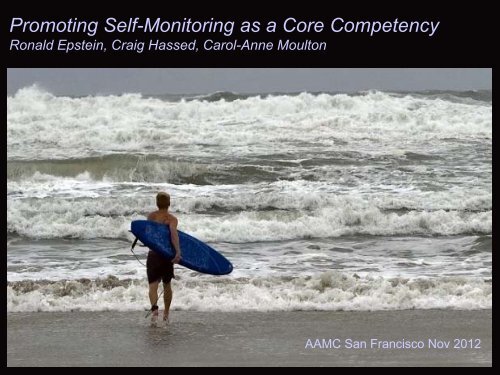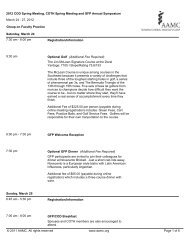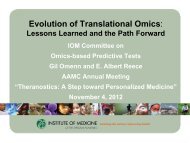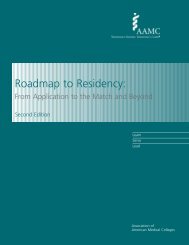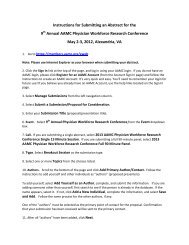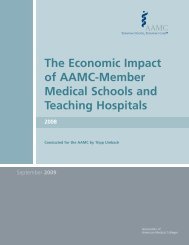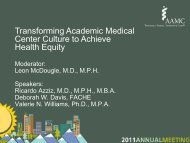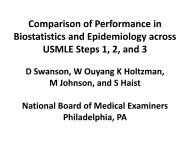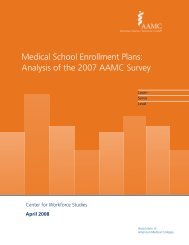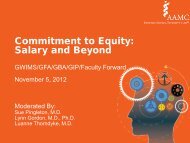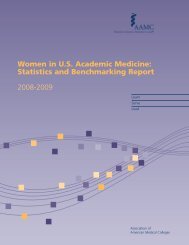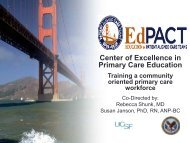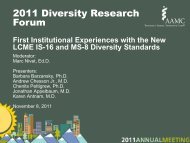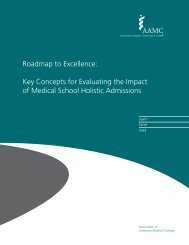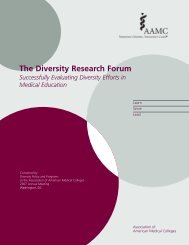Self-monitoring, medical errors and professionalism: A challenge for ...
Self-monitoring, medical errors and professionalism: A challenge for ...
Self-monitoring, medical errors and professionalism: A challenge for ...
- No tags were found...
Create successful ePaper yourself
Turn your PDF publications into a flip-book with our unique Google optimized e-Paper software.
Promoting <strong>Self</strong>-Monitoring as a Core CompetencyRonald Epstein, Craig Hassed, Carol-Anne MoultonAAMC San Francisco Nov 2012
Ronald Epstein MDProfessor of Family Medicine, Psychiatry, Oncology <strong>and</strong> NursingDirector, Center <strong>for</strong> Communication <strong>and</strong> Disparities ResearchDirector, Deans Teaching Fellowship ProgramUniversity of Rochester Medical Center, New York, USACraig Hassed MDSenior Lecturer, Dept of General PracticeSchool of Medicine, Monash University, Melbourne, AustraliaCarol-Anne Moulton MD PhDAssistant Professor, Department of SurgeryScientist, Wilson Centre <strong>for</strong> Educational ResearchUniversity of Toronto, Ontario, CanadaAAMC San Francisco Nov 2012
Physicianwell-being(resilience vs.burnout)Quality of care(vigilance vs.mindless <strong>errors</strong>)Quality of caring(presence vs.ab<strong>and</strong>onment)Shanafelt, T. D., et al. (2002). Burnout <strong>and</strong> self-reported patient care in an internal medicine residency program.Ann Intern Med, 136, 358-367; Shanafelt, T. D., et al. (2005). Relationship between increased personalwell-being <strong>and</strong> enhanced empathy among internal medicine residents. J Gen Intern Med, 20, 559-564.
Key points<strong>Self</strong>-<strong>monitoring</strong> is a professional obligation of physicians<strong>and</strong> contributes to quality of care <strong>and</strong> well-being.<strong>Self</strong>-<strong>monitoring</strong> is enacted haphazardly <strong>and</strong> inconsistently.It is possible to develop habits of self-<strong>monitoring</strong>, whichinclude intentionality, attentiveness, curiosity, beginner’smind <strong>and</strong> presence.Teaching self-<strong>monitoring</strong> is a primary task of <strong>medical</strong>educators.No one can self-monitor alone.
Since completing your training…• How well do you assess your own strengths <strong>and</strong> weaknesses?• How aware are you of your moment-to-moment per<strong>for</strong>mance during patientcare?• How aware are you of your blind spots when diagnosing <strong>and</strong> treatingpatients?• How often do you see a challenging situation from more than oneperspective?• How often do you respond to anxiety-provoking situations with curiosity <strong>and</strong>presence rather than avoidance, rigidity <strong>and</strong> distance?• How often do you make mid-course corrections based on new in<strong>for</strong>mation?• How did you learn these skills of awareness?
Are you a good driver?
1009080706050403020100actual scoreperceived abilitycompared with peersbottomquartile2ndquartile3rdquartiletopquartileKruger <strong>and</strong> Dunning, 1999
Unguided <strong>and</strong> unin<strong>for</strong>med self-reflectionsIs it possible to “know oneself?”SELF-ASSESSMENT OR SELF-DECEPTION?Eva & Regehr 2005
Qualities of mindful practitionersAttentive observationCritical curiosityBeginner’s mindPresence
Physicianwell-being(resilience vs.burnout)MindfulpracticeQuality of care(vigilance vs.mindless <strong>errors</strong>)Quality of caring(presence vs.ab<strong>and</strong>onment)
Ronald Epstein MDProfessor of Family Medicine, Psychiatry, Oncology <strong>and</strong> NursingDirector, Center <strong>for</strong> Communication <strong>and</strong> Disparities ResearchDirector, Deans Teaching Fellows ProgramUniversity of Rochester Medical Center, New York, USAMINDFUL PRACTICE ANDMINDFUL COMMUNICATION
Francesc Borrell-CarrioKevin EvaBrian HodgesGlenn RegehrJoan SargeantDan SiegelJordan SilbermanArnold P Gold FoundationArthur Vining Davis FoundationJohn W Kluge FoundationMannix FundPhysicians FoundationACKNOWLEDGMENTS
Change blindness
Looking but failing to see“The blue kidney”
ClinicianfactorsHabitsSituationalPatientFactorsMutableImmutableErrorsLarger systemFactorsFinancialRegulatoryMicro-systemfactorsTeamsEnvironmentEpstein RM 2011
PerceptualdistortionStereotypingFailure of curiosityUnexaminedemotionsOver-concretenessInadequate dataMisinterpretation of findingsPremature closureSituational cognitive impairmentIneffective communicationLack of self-<strong>monitoring</strong>BurnoutEpstein et al 2008 JCEHP
“DELUSION”“The tendency of the mind to seek premature closure...…that quality of mind that imposes a definition on things<strong>and</strong> then mistakes the definition <strong>for</strong> the actual experience”**Epstein M. 1995
Apter M. 1989
“… could this be something serious?”
Mindful practice =cultivating the observing selfMoment-to-moment purposefulattentiveness to one’s own mentalprocesses during every day work with thegoal of practicing with clarity <strong>and</strong>compassionEpstein RM 1999
Qualities of mindful practitionersAttentive observationCritical curiosityBeginner’s mindPresence
Can we learn to pay attention?Top-down (“alerting”)Bottom-up (“orienting”)Executive = reconcilingcompeting dem<strong>and</strong>sGusnard DA et al 2001
Seeing in<strong>for</strong>mation as novel, seeing “facts” as conditionalSeeing situations from multiple perspectives simultaneouslyTemporarily suspending categorization/judgment<strong>Self</strong>-questioningLowered reactivityMental stabilityLanger EJ 1997, James W 1895, Fitzgerald FS 1945,Borrell-Carrio F & Epstein RM 2005
Formal practiceIn<strong>for</strong>mal practiceReflective questionsNarrativeAppreciative inquiry interviewsDiscussionMINDFUL PRACTICEPROGRAMS
Seven minutes of redFor the next 7 minutes, record in writing thename of everything red that you see;Feel free to roam around, but do not talkSource: Maue K. Three days of red. In, Water in the Lake: RealEvents <strong>for</strong> the Imagination, 1979, New York: Harper <strong>and</strong> Row
Reflective questions to promote mindfulnessAttentive Observation“If there were data that you ignored, what might they be?”“What did you notice?” “What were you unable to see?”Critical Curiosity“What are you assuming that might not be true?”“What was surprising or unexpected?”Beginner’s Mind“What would a trusted peer say …?”“Can you see the same situation/patient with new eyes?”Presence.“At what points did you feel present <strong>and</strong> connected? Disconnected <strong>and</strong>distracted?”
Using narrativeFocus on a time when you made an error …Take 5 minutes to jot down a few key elements of thestory be<strong>for</strong>e telling it
Take 10 minutesFor the storyteller, address:What happened?What helpful qualities did youbring to that moment?Who else was involved, <strong>and</strong> howdid they contribute?What aspects of the context madea difference?What lessons from this story areuseful to you?For the listener:Be attentive, don’t interruptAsk questions to help yourpartner clarify <strong>and</strong> providedetailsDon’t talk about your ownideas or experiencesUse reflective questions <strong>and</strong>empathy when appropriate©Mindful Practice Programs, University of Rochester, 2010
Appreciative inquiry interviewsFocus on a difficult moment in which you wereat your best…Describe the event in detail, including personalattributes <strong>and</strong> contextual factorsReflect on how those attributes will be appliedin future situations
ThemesMeaningful experiencesDismissing patientsSurprises<strong>Self</strong>-careBurnoutDeath <strong>and</strong> dyingAttractionConflict
70 Primary care physicians, 46% Female, 49% Internists, mean of15.9 years in practiceSignificant improvements in:well being (burnout, mood)quality of interpersonal care (empathy, ps orientation)personality (emotional stability, attentiveness on NEO-FFI)MEDIATED BYimprovements in mindfulnessKrasner MS et al JAMA 2009
What did participants say?Interviews (n = 22) from among 46 participantswho completed >1/2 of phase 1 <strong>and</strong> >1/2 ofphase 2Analyzed thematically, coded, quotes extracted
Qualitative resultsCommunity“The most meaningful part was being with other physicians,sharing <strong>and</strong> discussing some of our experiences <strong>and</strong> beingable to have the immediate underst<strong>and</strong>ing of peers withrespect to the struggles that we all have.” (Participant #16)
Qualitative resultsSkills“I am much more attuned to listening. I put a mental stop watchin my head. I am much more attentive to non-verbal behavior<strong>and</strong> letting patients express their thoughts… I found out,without realizing it at the time, I wasn’t necessarilycommunicating well be<strong>for</strong>e. I [now] have a heightenedawareness <strong>and</strong> sensitivity to people’s conversation. I look atmy own communication <strong>and</strong> pay much more attention tothat. I pay much more attention in general.” (Participant #5)
Qualitative resultsPermission“In one of the classes we had to describe a traumatic experience,realizing that this was the first time I talked about it outside ofthe event that it happened, probably 2 years later. This was thefirst time I really expressed anything realizing that this mustreally mean something, having it all bottled up. That was anenlightening moment. (Participant #1)
Medical student required curriculum – 5 90-min 3 rd yr sessionsResident curricula4-day workshopsFaculty developmentRegional <strong>and</strong> international coursesMobile devicesCURRENTLY


